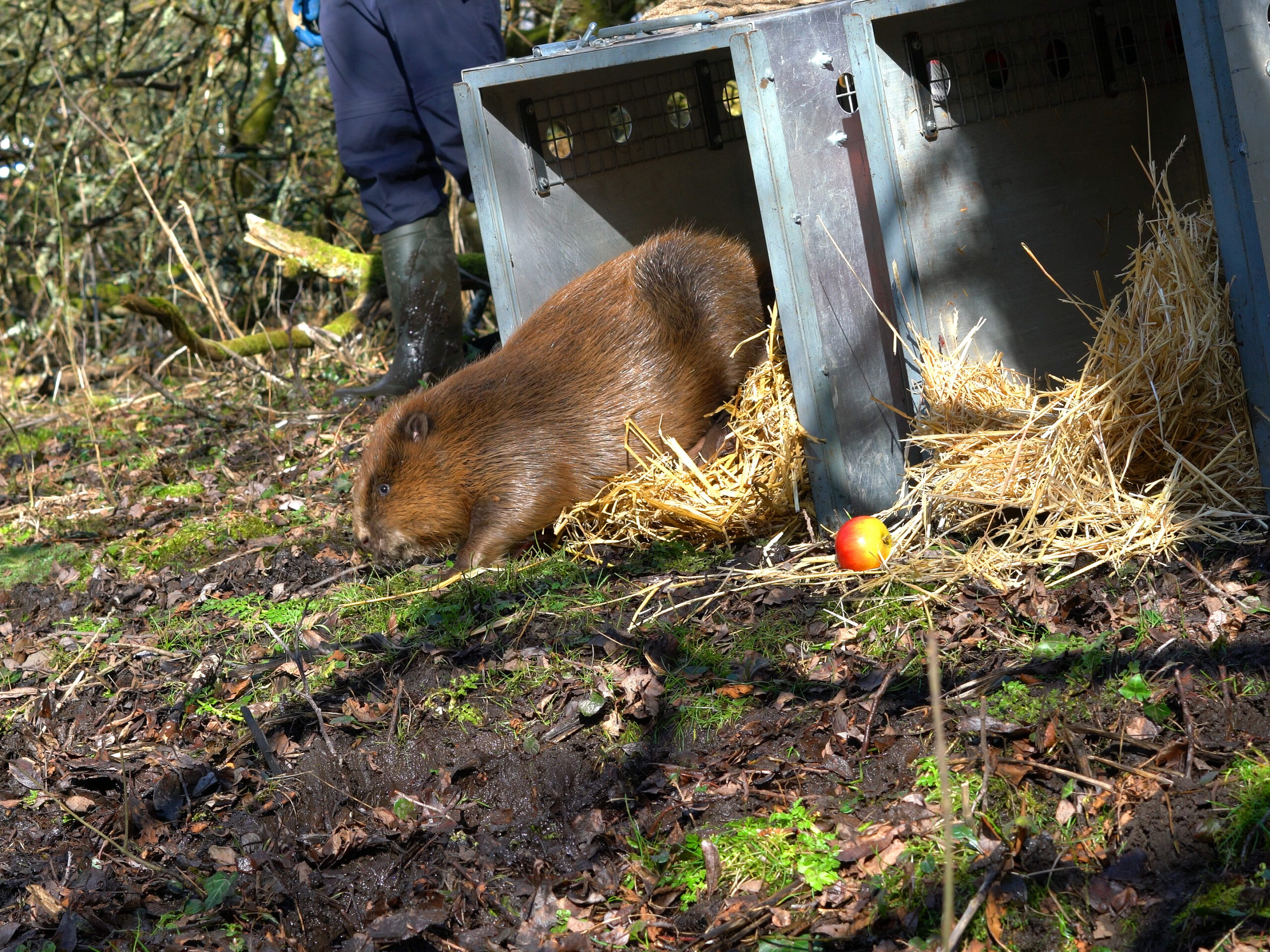Beaver comeback continues with reintroductions in five more counties in 2021
Around 20 of the semi-aquatic mammals will be introduced by wildlife trusts this year
A record number of beavers will be released into sites in England and Wales by wildlife trusts this year – 20 years after the semi-aquatic mammal first made a comeback.
Around 20 beavers will be reintroduced to five more counties in 2021, with the first of the releases taking place this week in Dorset when a male and female were let into an enclosed wetland, the Wildlife Trusts coalition of groups said.
Beavers were once native to Britain but were hunted to extinction in the 16th century for their fur, meat and scent glands, leading to the loss of the wetland habitat of lakes, mires and boggy places they were key to creating.
Wildlife experts are keen to return them to the landscape to help restore wetland habitats and boost other species, manage water and curb flooding, and create eco-tourism opportunities.
Following Dorset Wildlife Trust’s release of its pair of beavers, which will be monitored for their impact on the landscape, schemes are set to go ahead in the following counties:
– Derbyshire Wildlife Trust will release two beaver families and their kits into a 47-hectare (116 acre) enclosed area in Willington Wetlands reserve in the Trent Valley to increase the water storage capacity of the reserve.
– Subject to a successful licence application, Hampshire and Isle of Wight Wildlife Trust plans to release beavers into the reserve in the Eastern Yar on the island, in the hope the animals can be officially released into an open area rather than an enclosure.
– Nottinghamshire Wildlife Trust plans to reintroduce at least four beavers this summer into a huge enclosure in the Idle Valley Nature Reserve in the north of the county.
– The Welsh Beaver Project has been assisting Montgomeryshire Wildlife Trust with plans to release a pair of beavers into an enclosure in the Cors Dyfi Nature Reserve, near Machynlleth, Powys.
If it gets the go-ahead, it will be the first officially-licensed release of beavers in Wales, and the animals will help manage invasive willow and scrub which threaten the wetland areas of the lowland bog.

A male beaver at the water’s edge in its new home in Dorset
More schemes are expected in 2022, including the first urban beavers, which will be introduced into an enclosure in a 12-hectare (30 acre) site in central Shrewsbury, Shropshire, to take over from grazing cattle to prevent trees and shrubs invading the wetland.
It is 20 years since Kent Wildlife Trust released the first pair of beavers into a fenced area of fenland in the county in 2001, and more than a decade since the Scottish Beaver Trial began to see if the animals could be reintroduced to the wild in Britain.
Beavers which have escaped or been illegally released also now live wild on a number of rivers in England and Scotland, where some cause problems for landowners.
Beavers are back in Dorset: After years of preparation and anticipation, 2 beavers arrived at an enclosed site in Dorset on Monday. We’ll be monitoring their impact on the landscape. Find out more: https://t.co/WnBVlCujs9 ~ Alex🎥 Dorset Wildlife Trust/James Burland pic.twitter.com/q6GLvMFIQq
— Dorset Wildlife Trust (@DorsetWildlife) February 10, 2021
But a five-year project by Devon Wildlife Trust to monitor the beavers living wild on the River Otter found that the animals created a range of wetland habitats and built dams which reduced flood risk and prevented soil run-off and pollution.
Craig Bennett, chief executive of the Wildlife Trusts, said: “Beavers are a fantastic keystone species that have a hugely important role to play in restoring nature to Britain.
“It’s brilliant to see Wildlife Trusts across the UK ensuring a better future for wetlands and for a wealth of other wildlife by bringing back beavers whose engineering capabilities inject new life into wild places.
“The benefits for people are clear – beavers help stop flooding downstream, filter out impurities and they create new homes for otters, water voles and kingfishers.
“What’s more, people love seeing them and their presence boosts tourism in the countryside.”

Beavers were first introduced into a fenced fenland reserve in Kent
Having given the wild beavers on the River Otter the right to stay there, the Environment Department (Defra) is expected to release a public consultation on managing the species in England shortly.
The Wildlife Trusts want the Government to follow Scotland’s lead and make beavers a legally protected species in England, and make funding available for landowners and local management groups to reintegrate the species into the landscape.
The Press Association
Latest posts by The Press Association (see all)
- World Penguin Day: Test your knowledge with our penguin-themed quiz - April 23, 2024
- Kate’s new photo of Louis released to celebrate prince’s sixth birthday - April 23, 2024
- Alan Titchmarsh: Slugs are never going to be my friends - April 23, 2024
- Prince Louis celebrates sixth birthday - April 23, 2024
- Special episode of Planet Earth III to be narrated by schoolchildren - April 22, 2024






















